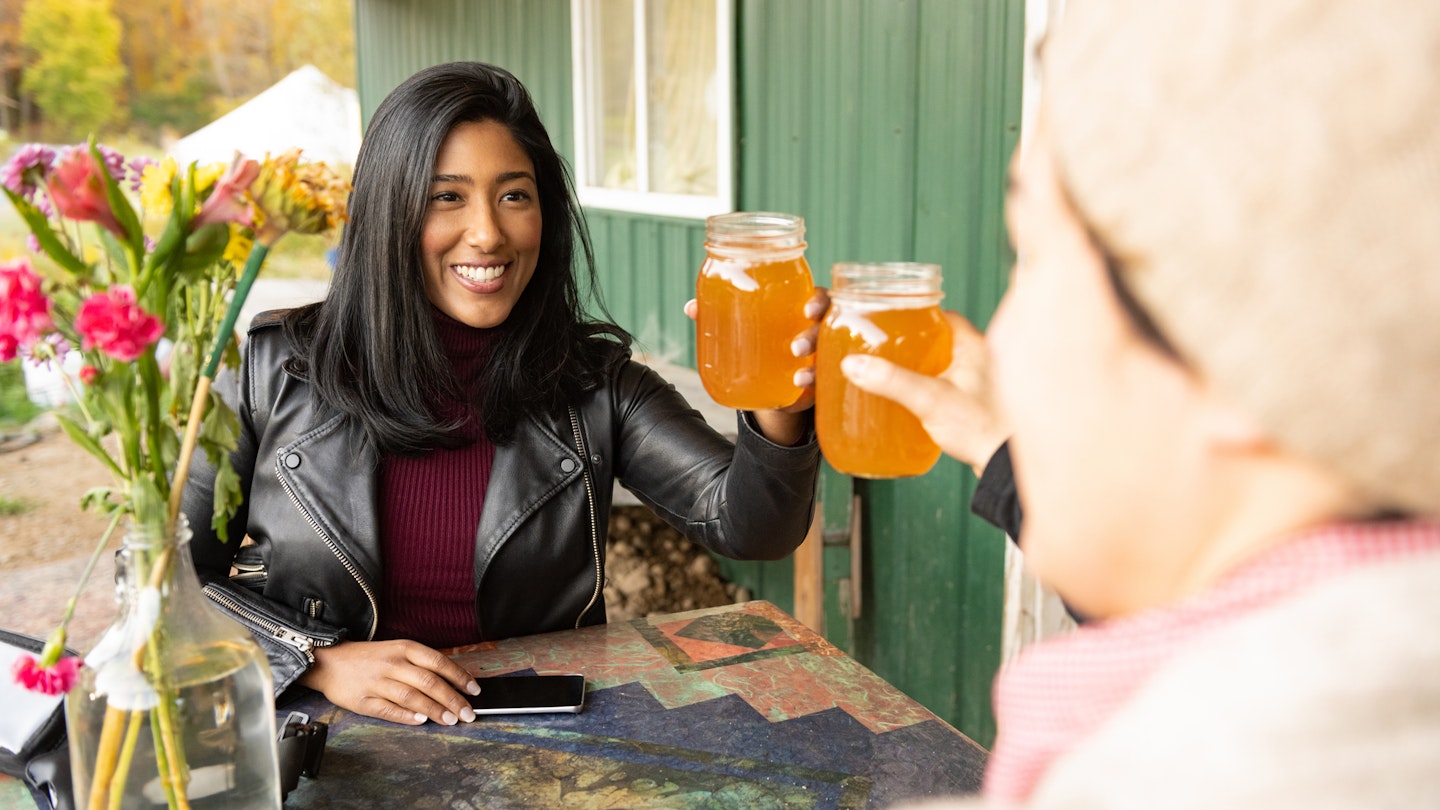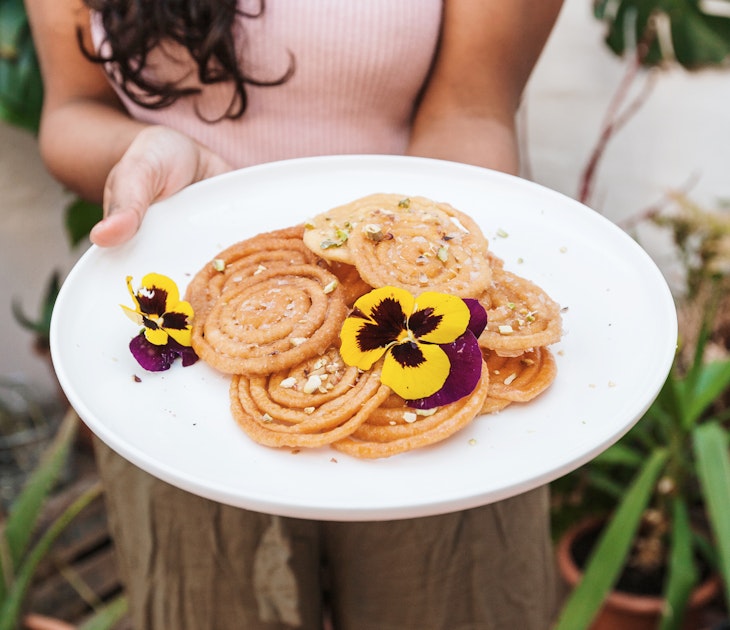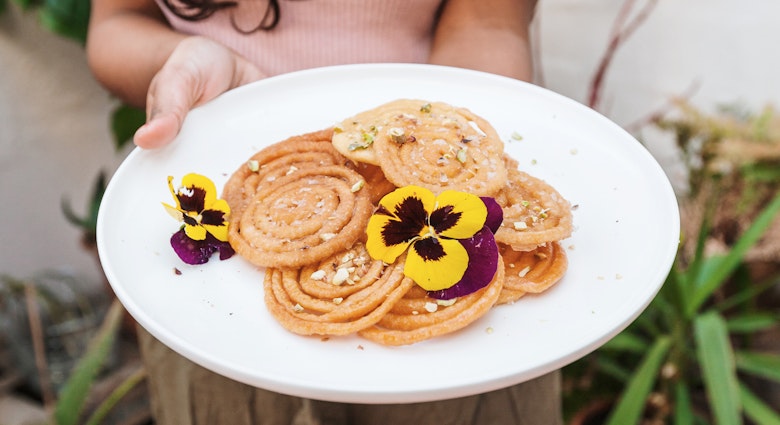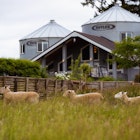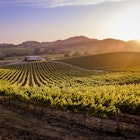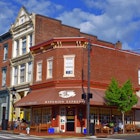The business of cider – an alcoholic beverage produced by fermenting the juice of apples – is absolutely thriving in Virginia.
This is largely thanks to the growing number of cider producers taking a forensic approach to its production, whether it’s by analyzing flavor profiles to discover which added ingredients complement which types of cider, or studying which types of apple grow best in Virginia’s dense, fertile soils.
“In the past decade, the number of cideries in the US has jumped from 200 to 1200,” says Michelle McGrath, chief executive at the American Cider Association. “Currently, we’re seeing more producers going all out to understand apple varieties and their potential, and Virginia does this exceptionally well. These cideries thrive on experimentation – apple varieties, production techniques and packaging are always being explored.”
Diane Flynt, an expert on Virginia’s cider scene and founder of Virginia’s Foggy Ridge Cider, agrees. “A focus on experimentation and on the fruit and terroir is what distinguishes Virginia cider,” says Diane. “In the past 10 years, we’ve seen more cideries growing their own fruit and purchasing Virginia-grown apples. I think the trend is leaning towards cider that reflects the place, the varieties and the growing conditions, along with a preference for careful fermentation over excessive sweetening.”
Then again, Virginia has always had a history of apple-related innovation. The state's earliest cider fans include Thomas Jefferson and George Washington. In the late 1700s, they planted some of Virginia’s first apple trees – a varietal known as the Newtown Pippin – at a time when hops reigned supreme, fuelled partly by German migrants’ love of beer.
The apples were a hit, not just in America but worldwide. Fans included Queen Victoria, who removed the import tax on the Pippin varietal in 1838. Today, Virginia ranks sixth when it comes to the US states that grow the most apples, although until recently they were primarily used in baked goods. Today, the growing number of cider-makers championing Virginia-grown apples has helped put the state on the cider-making map.

The apple enthusiasts shaking up Virginia’s cider scene
A great spot to kick off an apple-themed exploration of Virginia is Potter's Craft Cider, an innovative cidery tucked inside a century-old former church near Charlottesville, Virginia. What Thomas Jefferson and George Washington would make of the agave-infused ciders on offer in the taproom here, we’ll never know, but they’d almost certainly approve.
Potter's is a fitting place to find out what sets Virginia’s cider scene apart. Founders Tim Edmond and Dan Potter met at Princeton University and bonded over home brewing, and their experimental approach is one that’s being echoed by many of the area’s cider makers.
After working in finance in Washington DC, Tim swapped investment algorithms for apples and founded Potter’s Craft Cider with Dan. Both craved life in the countryside and a home-brewed cider provided the lightbulb moment. “Back in 2011 the few cideries that existed here made generic sweet ciders,” says Tim. “One day, Dan bought some Virginia apples from a farmers’ market, fermented them and made a dry cider. I’d never tasted anything like it. I thought: this is what we should do.” The duo’s dry, zero-carb ciders, which contain no added sugar, were an instant hit.
Their determination to innovate didn’t stop there. Tim and Dan invested heavily in hi-tech equipment used to harness the potential of Virginia’s apples and also sought inspiration from techniques used by local winemakers. “In the same way that the right grapes make a beautiful Sauvignon Blanc, apples do similar things if you can extract their aromatic expression,” says Tim, who spends much of his time in the cidery’s on-site lab, a Willy Wonka-esque set-up filled with spectrophotometers and microscopes.
But there are plenty of nods to tradition, too, particularly to Virginia’s wine-making heritage. This past August, Tim popped the cork on the cidery’s first champenoise-style cider (using a method for making sparkling wine), initially fermented in American oak barrels and made with yeast strains that highlight the apples’ unique flavor compounds – ones commonly found in champagnes. A second fermentation provides the all-important CO2.
Tim says that their best-selling cider is the Sod Cutter, a tart, sour tipple made with pineapple and agave, although the Grapefruit Hibiscus cider, flavored with grapefruit peel and hibiscus, comes a close second. ‘We don’t really have a cider-making tradition here in the US, unlike in England,” says Tim, “but the upside is that we’re not afraid to break rules – we’ll put hops in a cider or make margarita-flavored ciders because we’re still discovering what we are.”

Building on tradition with innovation and fresh ideas
At Stable Craft, a sprawling brewery and cidery nestled in Virginia’s Shenandoah Valley, the growing selection of award-winning ciders isn't the only attraction – you can also sleep amid the apple trees in quaint cabins with Adirondack chair–dotted patios. Although numerous local companies now offer guided tours of Virginia’s cideries, knowing that your accommodation is a short stagger from the tasting room is undoubtedly a major draw.
Stable Craft, a brewery founded in 2006, is a relative newcomer to the cider scene, branching out from beer to cider in 2019. When current head brewer Tony Zappaunbulso arrived in 2020, he realized that Virginia’s water was perfect for cider making. “For beer, you want lots of minerals,” says Tony. “But the water in Virginia isn’t particularly mineral-rich, so it’s a blank canvas.” This lack of minerals hasn’t stopped Stable Craft’s beers from accruing various awards, but it certainly made life easier for Tony when he set about creating unusual cider flavor combinations. In 2022, Just Peachy, a peach-infused cider, was named Best Cider of the Year at the Brewski Awards. “We recently did a Moscow mule–inspired cider with ginger and lime notes,” says Tony. “And for Cinco de Mayo we did a mango habanero one.”
At Albemarle Ciderworks, in North Garden, Virginia, owner Charlotte Shelton focuses purely on heritage varieties of apple trees, which thrive particularly well in Virginia. It’s a beautiful property, with a stunning barn-like tasting room that's proven popular with passing hikers, and surrounded by rolling hills and vast apple orchards. The cidery’s close proximity to several vineyards – one of which is a 15-minute walk away and has on-site accommodation – allows Charlotte and her team to showcase their offerings to the wine lovers who visit the region and have heard about the growing popularity of its ciders.
“North Garden doesn’t have a stoplight, but it’s got three wineries and one cidery!” says Charlotte. Fittingly, for a cidery that focuses on heritage varieties, Albemarle Ciderworks is close to Monticello, where Thomas Jefferson grew 18 types of apple trees. This cidery is known for a more traditional approach to cider making – the ciders are typically sweet, and feature carefully selected combinations of apple varietals (rather than ingredients more commonly found in cocktails, as found at some of the more experimental cideries).
Albemarle Ciderworks worked closely with one of the world’s top pomologists (an expert in the cultivation of fruit), the late Tom Burford, and Charlotte, who recently returned from a cider-themed research trip to Bristol, England, sits on the board of the United States Association of Cider Makers. But this more traditional approach is a reminder of the beauty of Virginia’s cider scene – there’s room for everyone.
Tim and Dan at Potter’s Craft Cider, for example, founded a research exchange that allows others to benefit from their experimentation. They believe this will give Virginia cider the regional identity – one increasingly based on innovative approaches, non-traditional flavor profiles and techniques borrowed from the wine industry – it deserves.

A healthier alternative for everyone
Cider is typically high in both carbohydrates and sugars, but the innovative cider-makers in Virginia have been keen to tap into a new generation of health-conscious consumers, with low-carb and low-sugar ciders. In fact, Tristan Wright, founder of Alexandria’s Lost Boy Cider, Virginia’s first urban cidery, began his love affair with cider due to health concerns. He was diagnosed with coeliac disease, which meant cutting out gluten – something found in most beers, but not ciders. “My wife suggested I start making my own, so I started in my kitchen.” He then left the world of banking, kick-starting a career in cider-making with a stint studying viticulture at Cornell University – another reminder that Virginia’s cider producers are heavily influenced by winemaking.
“People still tend to associate cider with autumn here, which always bothers me,” says Tristan, who sources his apples from Virginia’s Blue Ridge Mountains. He has helped bust this particular myth by creating seasonal ciders such as the springtime-friendly Cherry Blossom, made with cherries and jasmine, and the refreshing Ciderita, made with limes and Himalayan salt.
And for further proof that Virginia’s cider makers aren’t motivated by cold, hard cash but by passion, look no further than Lost Boy Cider’s logo. “It depicts a young boy with his sleeves rolled up, ready to stamp on an apple,” says Tristan, whose ciders now ship to 38 states. “I feel like the apples found me when I was a little down and out, so the name represents how it’s okay to change course and be lost – to be on that journey and to keep going.” And I suspect the nation’s cider drinkers are very grateful he did.
